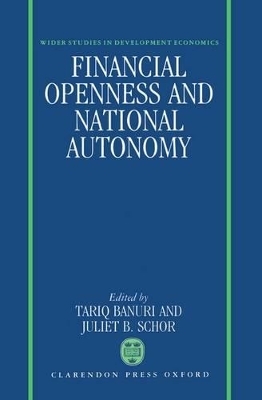
Financial Openness and National Autonomy
Clarendon Press (Verlag)
978-0-19-828364-5 (ISBN)
WIDER
The World Institute for Development Economics Research, established in 1984, started work in Helsinki in 1985, with the financial support of the Government of Finland. Its principal purpose is to help identify and meet the need for policy-oriented socio-economic research on pressing global and developmental problems and their inter-relationships. WIDER's research projects are grouped into three main themes: hunger and poverty; money, finance, and trade; and development and technological transformation.
The 1980s ushered in a `globalization' of finance, and governments began rejecting the task of engaging in international financial management. A new doctrine - global neoclassicism - arose, based on the idea that government regulation of financial markets was futile and foolish.
The authors of this book tackle the question of whether national policy autonomy is still possible, in the process challenging the new orthodoxy, and the dangers attendant upon deregulation. They explore the `political economy' of financial openness, and the political nature of recent developments such as the ascendency of private financial interests and a reduced role for government regulation. The book includes both general historical and theoretical approaches, as well as case studies of various countries, such as Australia, Mexico, and Pakistan. It represents a major contribution in the political economy of international finance.
Juliet B. Schor: Introduction; Part I: How has the World Changed?: Andrew D. Cosh, Alan Hughes, & Ajit Singh: Openness, financial innovation, changing patterns of ownership, and the structure of financial markets; Robert Zevin: Are world financial markets more open? If so, why and with what effects?; Part II. Why has the World Changed? Bankers and States: Robert Pringle: Financial markets versus governments; Andrew Glyn: Exchange controls and policy autonomy: The case of Australia, 1983-1988; Gerald A. Epstein & Juliet B. Schor: Structural determinants and economic effects of capital controls in OECD countries; Part III. Looking Ahead: Policy Behaviour in an Open World: Gerald A. Epstein & Herbert Gintis: International capital markets and the limits of national economic policy; Jaime Ros: Capital mobility and policy effectiveness under a credit run: The Mexican economy in the 1980s; Tariq Banuri: Black markets, openness, and Central Bank autonomy; References; Index.
| Erscheint lt. Verlag | 2.4.1992 |
|---|---|
| Reihe/Serie | WIDER Studies in Development Economics |
| Zusatzinfo | line drawings, tables |
| Verlagsort | Oxford |
| Sprache | englisch |
| Maße | 165 x 241 mm |
| Gewicht | 1 g |
| Themenwelt | Sozialwissenschaften ► Politik / Verwaltung ► Staat / Verwaltung |
| Wirtschaft ► Volkswirtschaftslehre ► Finanzwissenschaft | |
| Wirtschaft ► Volkswirtschaftslehre ► Makroökonomie | |
| ISBN-10 | 0-19-828364-4 / 0198283644 |
| ISBN-13 | 978-0-19-828364-5 / 9780198283645 |
| Zustand | Neuware |
| Haben Sie eine Frage zum Produkt? |
aus dem Bereich


